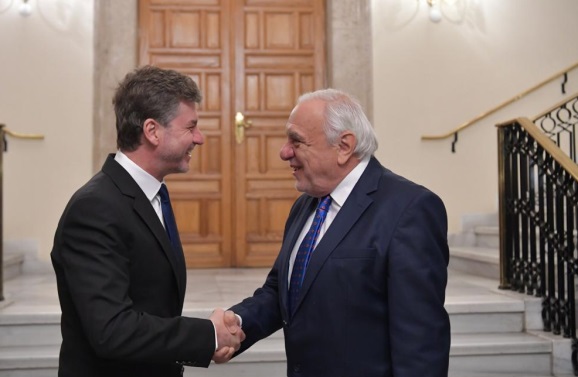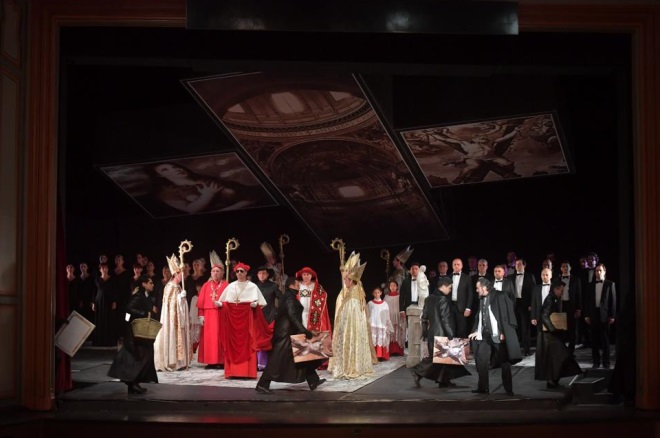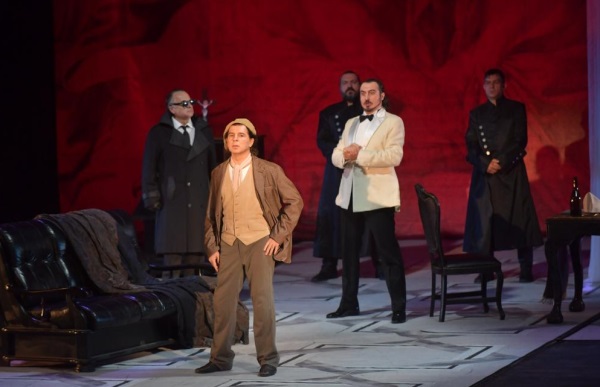ANKARA/Türkiye: TOSCA guest performance by the Sofia Opera on 8 November 2023
The opera as an example of international partnership

On the right, the director and general director of the Sofia Opera, Plamen Kartaloff: Photo: Yusuf Emre Turan
100 years ago, the eternal father of the country Mustafa Kemal Pasha, Atatürk, proclaimed the Republic of Turkey, on 29 October 2023 to be exact. The Ottoman Empire had effectively collapsed during World War I. The capital was moved from Istanbul to Ankara, today a modern and interesting metropolis that is also home to Atatürk's spectacular mausoleum.
To mark this historic occasion, the Sofia Opera and Ballet from Bulgaria staged a guest performance of their production of Giacomo Puccini's "Tosca" on 8 November in Ankara and 11 November in Istanbul. Kemal Atatürk, the great reformer, was an admirer of opera, and he was particularly fond of Puccini's "Tosca". The general director of the Sofia Opera and director of the production, Plamen Kartaloff, therefore wanted to use this guest performance to combine the importance of art, i.e. the art of opera, for mutual understanding across national borders with the commemoration of Atatürk. A completely successful project after this evening in Ankara. And in the much larger opera house in Istanbul three days later, the response from the Turkish audience was even more impressive!

Photo: Yusuf Emre Turan
It is the simplicity of Miodrag Tabacki's set design that makes this production so convincing, with an appropriate lighting design by Andrej Hajdinyak and Emil Dinkov, as well as excellent characterisation by the singer-actors, who also have great freedom in the interpretation of their roles. A huge Christian cross hanging above the stage dominates the first and third acts. It is decorated with Christian paintings relating to the play and thus provides a certain interpretation and harmonious associations with the plot. The cross depicts a biblical crucifixion and the domed vault with the apse of the church of Sant'Andrea della Valle as well as the portrait of Attavanti. The marble floor of the church is recognisable. The procession of high-ranking Christian dignitaries to the Te Deum is impressive. In Act 3, on the other hand, we see the grey cobblestones of the top platform of Castel Sant'Angelo with St Peter's Basilica in the background – classic. The Sofia Opera's exciting production was very well received by the audience, with a high proportion of celebrities and political representatives. Officials from both countries gave lengthy speeches at the beginning of the evening and the Turkish national anthem was also played.

Photo: Yusuf Emre Turan
Radostina Nikolaeva, the great Sofia soprano for Puccini, Wagner and Verdi et al, gave an impressive Tosca, both acting and singing, an almost ideal embodiment of the role. At this level, she could easily sing and play the diva on any major Western European stage. The Romanian Ionut Pascu thrilled the audience with an incredibly authentic and intense portrayal of Baron Scarpia, also with the superb vocal articulation of his baritone. His actions were at times as thrilling as in a thriller. Kostadin Andreev sang Cavaradossi with great power, but again lacked vocal dimension and subtlety. The tenor, who also sings a powerful young Siegfried in addition to the Italian and French repertoire, could do much more with his great material. But it seems that he is not convinced of this and is primarily focussed on volume.
Angel Hristov was a very good Angelotti, who you can sympathise with the hardships of the escape, and Petar Buchkov, the Sofia Hagen – it's hard to believe – made his debut here as Messner. The other supporting roles were also well cast. The chorus, which made a very strong appearance in Act 1, was provided by the Ankara State Opera and rehearsed by Nikolay Merdzhanov.
The GMD of the Ankara State Opera, Sunay Muratov, conducted the orchestra of the Sofia Opera and Ballet and interpreted the intense action on stage with equally expressive drama and musical colour from the pit. The result was a performance as if cast from a single mould. The audience applauded loudly and for a long time, also for the individual arias during the performance.
Klaus Billand
